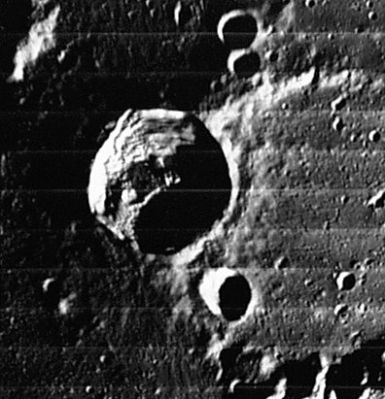Difference between revisions of "Anaxagoras"
| Line 28: | Line 28: | ||
** [[Wood%2C%201971|Wood, 1971]]: 1.0 km <span class="membersnap">- tychocrater <small>Mar 17, 2008</small></span> | ** [[Wood%2C%201971|Wood, 1971]]: 1.0 km <span class="membersnap">- tychocrater <small>Mar 17, 2008</small></span> | ||
* Measures on LRO QuickMap give max central peak height about 900 m | * Measures on LRO QuickMap give max central peak height about 900 m | ||
| − | ** [[Sekiguchi%2C%201972|Sekiguchi, 1972]]: 1 km <span class="membersnap">- | + | ** [[Sekiguchi%2C%201972|Sekiguchi, 1972]]: 1 km <span class="membersnap">- fatastronomer</span> |
* Included in [[ALPO%20list%20of%20bright%20ray%20craters|ALPO list of bright ray craters]]. | * Included in [[ALPO%20list%20of%20bright%20ray%20craters|ALPO list of bright ray craters]]. | ||
* West rim slope 38°, east rim slope 40° ([[Pohn%2C%201963|Pohn, 1963]]) | * West rim slope 38°, east rim slope 40° ([[Pohn%2C%201963|Pohn, 1963]]) | ||
Latest revision as of 19:32, 16 April 2018
Contents
Anaxagoras
|
Lat: 73.46°N, Long: 10.06°W, Diam: 50.99 km, Depth: 4.5 km, Rükl: 4, Copernican |
Images
LPOD Photo Gallery Lunar Orbiter Images
Maps
(LAC zone 3B4) USGS Digital Atlas PDF
Description
Elger
(IAU Directions) ANAXAGORAS.--A brilliant ring-plain of regular form, 32 miles in diameter, adjoining Goldschmidt on the W. It is a prominent centre of light streaks, some of which traverse the interior of Goldschmidt. On the north a peak rises to the height of 10,000 feet. There is a long ridge on the floor, running from W. to E.
Wikipedia
Additional Information
- IAU page: Anaxagoras
- Depth data from Kurt Fisher database
- Westfall, 2000: 3.06 km
- Cherrington, 1969: 2.71 km
- Measures on LRO QuickMap give max depth about 4.5 km
- Central peak height
- Wood, 1971: 1.0 km - tychocrater Mar 17, 2008
- Measures on LRO QuickMap give max central peak height about 900 m
- Sekiguchi, 1972: 1 km - fatastronomer
- Included in ALPO list of bright ray craters.
- West rim slope 38°, east rim slope 40° (Pohn, 1963)
- Exterior impact melt deposits most extensive to ESE, max of ~15 km beyond rim. Most extensive ejecta, rays and secondary craters to the ESE, with max wall slumping on NNW side of crater, and topographically lowest rim crest to E (Hawke and Head, 1977).
- TSI = 25, CPI = 20, FI = 20; MI =65 Smith and Sanchez, 1973
- Within highlands, more than 98% anorthosite in central peak, and 0.2 to 0.6 Maturity Index (not mature) Ohtake and others, 2009
- NASA has selected a small area near the central peak as a Region of Interest for investigation in connection with its Constellation program of exploration.
- LOLA, altimetric (false-color) view showing two successive sets of profiles of the floor region.
Nomenclature
- Named for Anaxagoras (ca. 500 BC–428 BC), a pre-Socratic Greek philosopher and astronomer. He brought philosophy and the spirit of scientific inquiry from Ionia to Athens. His observations of the celestial bodies and the fall of meteorites led him to form new theories of the universal order. He attempted to give a scientific account of eclipses, meteors, rainbows and the sun.
LROC Articles
(the amount of Anaxagoras-related LROC articles seems to be not quite small, a list of them is about to be compiled - DannyCaes Mar 28, 2016)
LPOD Articles
- Over the Pole
- North Polar Rays
- Was Anaxagoras an Oblique Impact Page One of a New Book
- Interesting Big Stuff (LRO's Close Up)
Bibliography
Named Features -- Prev: Amundsen -- Next: Anaximander
